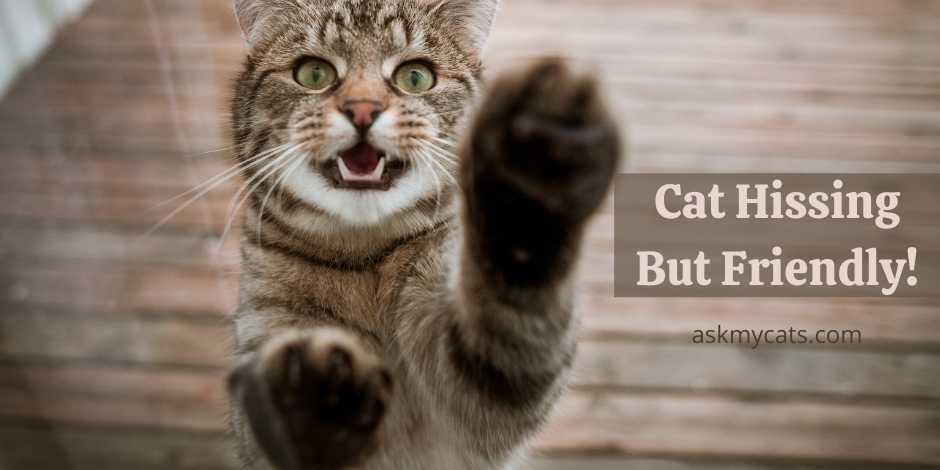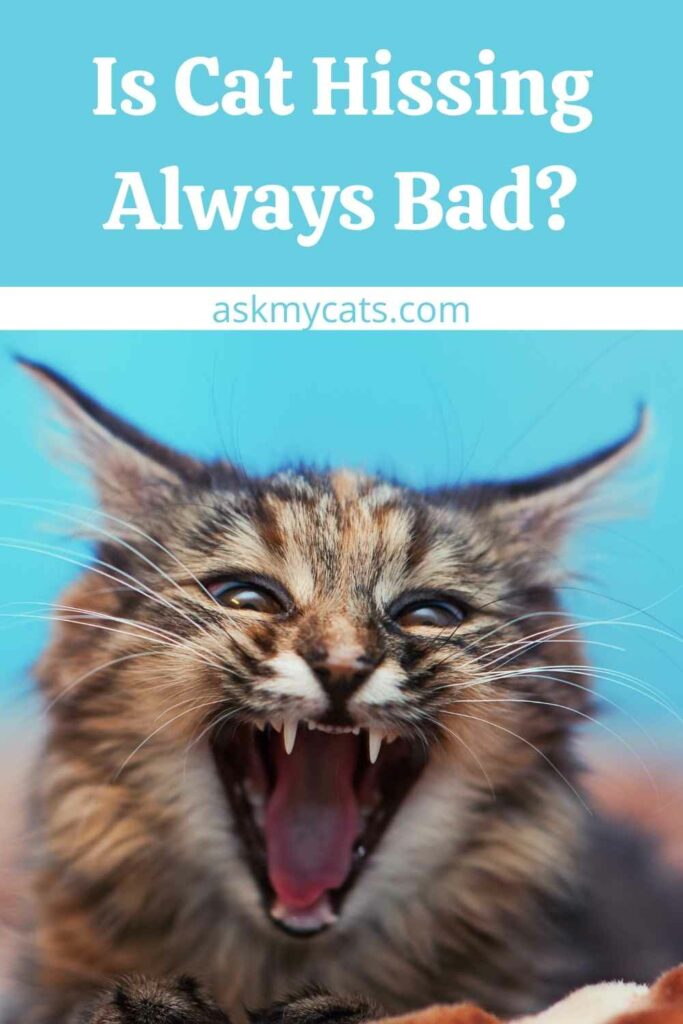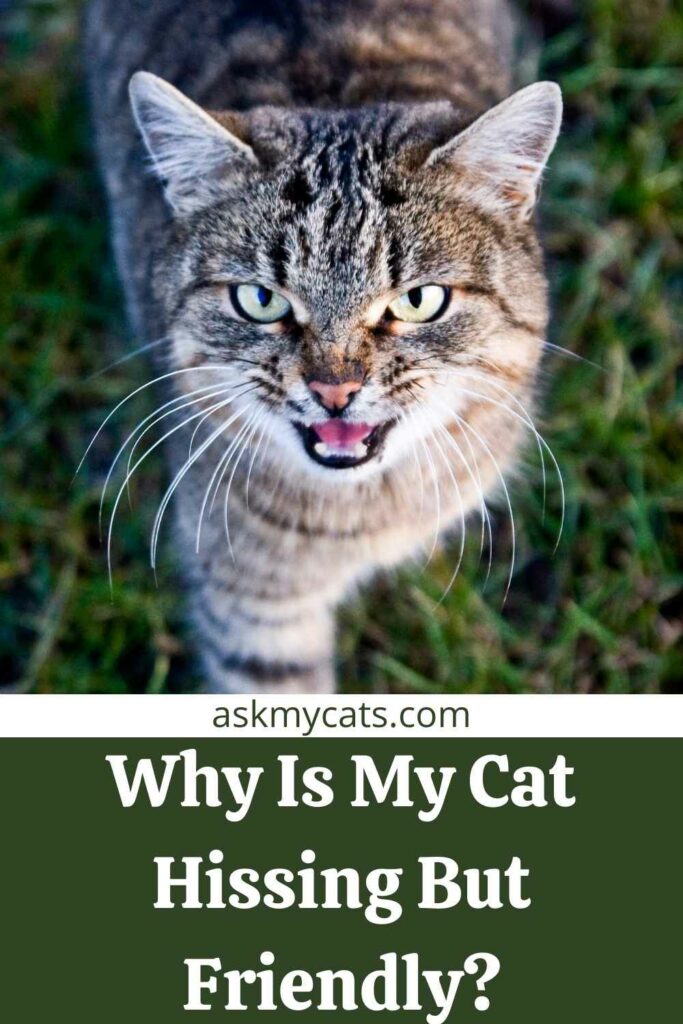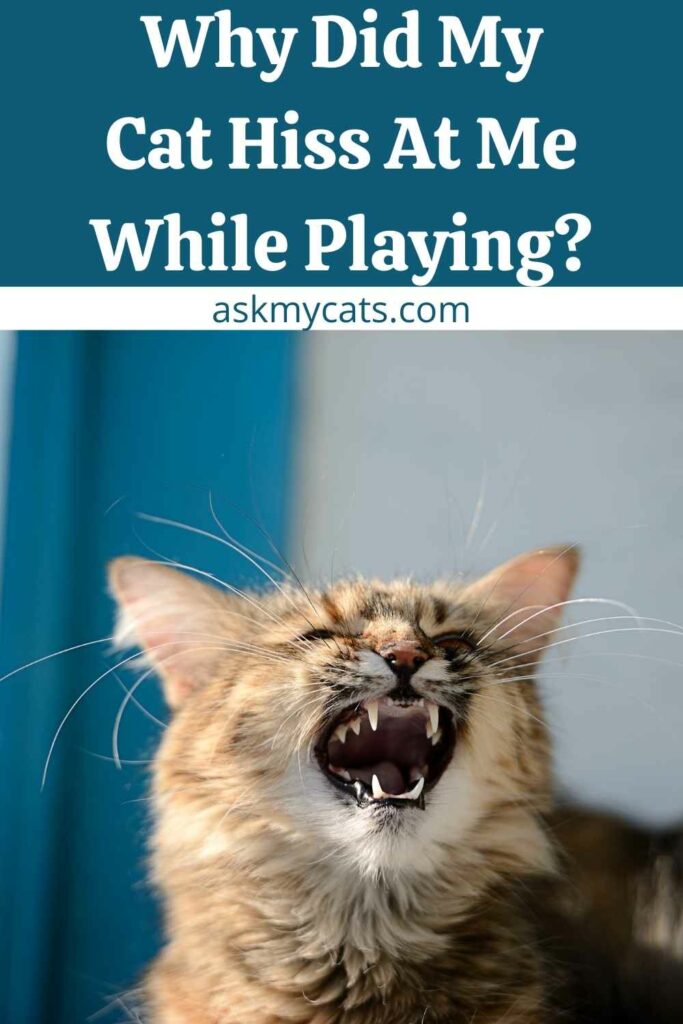Cat hissing is a fearful action that serves as a warning to others, but it’s also linked to other unpleasant emotions like rage and distrust. It might also be a symptom of a health problem.
Understanding the science underlying hissing will help you comprehend cat communication and, as a result, help your cat thrive.
Your cat may be friendly in general, but something is driving them to hiss at you. A friendly cat hisses most of the time because it has had too much interaction and wants to be left alone for a bit. Alternatively, your cat might be in agony and want assistance.
If your generally sociable cat starts hissing at you for no apparent reason, it’s time to pay attention.


Give Your Cat the Perfect Day
Get the Free Ebook!
Is Cat Hissing Always Bad?
Yes, cat hissing is a warning against something that they don’t like.

When a cat is threatened, it will unleash a blast of air from its lips, which produces a hissing sound. Other cat body language indicators such as bared fangs, flattened ears, an arched back, and their hair standing on edge are generally associated with this sound (also known as piloerection).
When examining why cats hiss, it’s vital to remember that hissing is a perfectly natural behaviour that allows your cat to communicate with you. Whereas humans can communicate through words, cats must rely on their body language to connect with us and other animals.
First and foremost, if your cat is hissing at you, give them some space. You don’t want to provoke an assault or violent behaviour from them. Keep a careful check on your cat’s body language at all times; this way, you’ll be able to tell how they’re feeling before stroking them and avoid your cat hissing at you.
Additionally, if you have children, you should educate them how to pet and respect a cat, as youngsters have a hard time detecting indicators that your cat is scared or nervous.
You should also make sure that your home has plenty of hiding places for your cat to go when they’re stressed. Igloos, cat trees, and high-up areas are ideal since they provide them with some privacy.
Why Is My Cat Hissing But Friendly?
It’s possible that your cat is in pain or is irritated, and when you touch it in a particular location, your friendly cat will alert you to back off before it scratches or bites you.

If your cat is typically quite sociable, but hisses at you when you touch it, you should arrange an appointment with your veterinarian. It is best to give your friendly cat some room if it hisses at you unexpectedly.
Cats may hiss when they are ill, especially if they have a chronic condition. If your cat’s body isn’t operating properly due to organ failure or serious illness, she may hiss often.
Again, if you suspect this is the case, you should take your cat to the veterinarian right once. If you detect these problems early on, you may be able to treat or at least control your cat’s health condition in the future.
Anxiety or fright is another major reason of hissing in cats.
If your cat is scared of anything, she may hiss frequently. For example, if you have a dog in your house that your cat is terrified of, she may hunch down and hiss, even if she has no cause to be worried.
Fearful cats may flatten their ears flat against their heads, puff up their tails, and keep their eyes extra-wide open. These are all good indicators that your cat’s hissing is caused by fear.
Anxiety is comparable to this. If your cat is unexpectedly placed in an unfamiliar scenario that makes her feel uneasy or agitated, she may hiss and display comparable body language.
In cats, redirected aggressiveness and petting aggression are both prevalent behaviour problems. Anxiety and/or a change in habit or surroundings might cause these symptoms to be moderate and self-limiting.
They can also develop into a more chronic and serious problem that compromises the human-animal relationship. If your cat is exhibiting these symptoms, you should contact your veterinarian as soon as possible.
Why Did My Cat Hiss At Me While Playing?
Cats can hiss at you while playing because your cat suddenly feeling threatened and afraid. You may have stomped on your cat’s tail by mistake or hissed too loudly. Or maybe you drew on the play for too long, and your cat now believes you’re mad at it.

In any case, it’s possible that your cat is hissing at you because it feels threatened and wants a break from you. At this point, don’t try to chase your cat; it will just make things worse, and you could be scratched or bitten.
Your cat hisses to express their displeasure at being harassed. Some cats hiss because they want you or another human family member to leave them alone and give them their space, and they may hiss at other pets in the same manner.
If your cat is wary of humans or other animals, she may hiss frequently to warn intruders to stay away. This is only a warning to let these individuals or dogs know that if they don’t listen, they could get scratched. If you continue to harass her, you could get a swat or two!
Finally, while hunting for a mate, non-neutered male cats may hiss. They do this to demonstrate to other male cats that they have sharp fangs and can fight. This might also be a warning that your cat is ready to get into a fight with another cat, so if you see this behaviour and are able to safely relocate your cat, and do so.
These aren’t the only reasons your cat can be hissing a lot, but they are some of the most typical issues associated with excessive cat hissing.
If you can’t figure out what’s causing your cat’s strange behaviour, you should take him to the doctor. Because health issues and discomfort might be contributing causes, it’s crucial to rule them out as you try to figure out what’s wrong with your cat.
Do Cats Hiss When Happy?
A happy cat will not hiss, although a cat who is otherwise happy may hiss if it has a temporary reason to do so. For example, a cat or human approaching it or attempting to touch it when it does not want to be touched.
As previously said, your cat might be in agony. When their paw or tail is stepped on, they will howl, hiss, or both as a result of the agony. When you pet their head, they may have an infection in their jaw, which causes pain.
Because cats and dogs, like people, are prone to arthritis, if your elderly cat screams out or hisses at you when you pick it up or pet it, it might be suffering from arthritic discomfort.
Only a veterinarian can tell if your cat’s pain is due to arthritis or something else, such as cancer. Infections, soft tissue injuries, and dental disease are all causes of discomfort.
Can Cats Hiss In A Playful Way?
Yes, cats can hiss in a playful way.
The play hiss is a shorter version of the defensive hiss, and it’s especially prevalent among kittens. You’ve undoubtedly seen a young cat spring up and hiss, his fur standing on edge, in response to a sudden loud noise.
If his littermates are becoming a bit too rough in their play, a kitten may hiss.
Why Does My Cat Hiss At Me Then Cuddle?
Your cat hisses and cuddles you due to his petting induced aggression.
If your cat bites, scratches, or hisses at you while you’re caressing her, she’s most likely displaying petting-induced aggressiveness.
Frequently Asked Questions
Why Does My Cat Hiss When Happy?
A hiss might indicate minor discomfort or irritation. If you try to stroke a fluff ball’s back and he hisses, he can be overstimulated.
Is hissing at your cat good?
You should not hiss at your cat since it will frighten the small animal and make it afraid to approach you. Cats communicate by movement, eye contact, tail and head bumps, and hissing. When you replicate your cat’s language, they’re more likely to recognize when they’re doing something wrong.
Should I let my cats hiss at each other?
Allow them both out as long as they seem relaxed. Don’t be shocked if you hear some hissing when they see one other. There’s also a lot of mild swatting going on.
Final Words
A cat hissing at you doesn’t always imply you did something wrong, especially if you were caressing and affectionate with it. It’s possible that they’ve had enough of affection and want some space.
Leave your questions in the comments section below.
